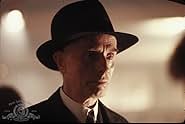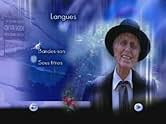Julian Beck(1925-1985)
- Actor
- Director
- Second Unit Director or Assistant Director
A bold, innovative, avant-garde figure in theatre who helped
revolutionized the style of playwriting and acting in the 1950s and
1960s, actor/writer/producer/directer Julian Beck was certainly a
odd-looking sort with his baleful, hollow eyes, stark and skullish
features and near-bald dome capped by long fringes of stringy hair
along the side. He could have easily given inspiration to the creepy
look Richard O'Brien gave his bizarre
character in "The Rocky Horror Show."
Born in the Washington Heights section of Manhattan in New York City, Julian was the son of Irving, a businessman, and Mabel Lucille (Blum) Beck. Educated at the College of the City of New York, he briefly attended Yale University, but then abandoned it to pursue writing and art. An abstract expressionist painter in the 1940s, his life's destiny was forever changed after meeting his future wife, actress/writer/director Judith Malina, in 1943. His passions swiftly centered around the likes of hers -- the theatre -- and together they co-founded The Living Theatre in 1947, which would base itself in New York City. Their subsequent contributions propelled the off-off-Broadway movement and the vision of performance art. Julian would continue to work with the Living Theater up until his death nearly forty years later.
The group strongly reflected the ideals of another theatre revolutionary, Antonin Artaud (1896-1948), who embraced the Theatre of Cruelty and sought to jar its audiences out of their own complacency. The plays were presented in various venues, chiefly in the couple's own home when it couldn't financial keep up a theatre space. The Living Theatre also spread its philosophy throughout the world, performing extensively in non-traditional places such as street corners and prisons. In one performance piece, from Jack Gelbert's "The Connection," the drama about drug addiction had its actors playing junkies and wandering about the audience shouting expletives while demanding money for a fix. They were among the first to import the plays of Bertolt Brecht and Jean Cocteau, as well as modernist poets such as T.S. Eliot and Gertrude Stein. Their productions could be undeniably repelling or imaginative and often involved collective improvisation. It took on an anarcho-pacifist point of view while celebrating the uninhibited use of drugs, hallucinogens, crude language and anything else under the kitchen sink in order to send home its political intent or shock effect. One of their their most controversial works was "Paradise Now" (1968), a free-form denouncement of American life that involved nudity and audience participation. Other productions include "The Brig" (1963), "In the Jungle of the Cities" (1960), The Brig (1963), "Frankenstein" (1968) and Antigone (1968). Their work often led to their frequent arrests for anything from indecent exposure to drug possession.
The Living Theater moved out of New York for a time in 1974 due to tax problems and a sensationalistic trial that Beck and Malina lost. Besides his theatre work, Beck published several volumes of poetry reflecting his left-wing, anarchist beliefs, two non-fiction books and a handful of experimental and mainstream films. His intense, imposing acting style was captured vividly in films, such as his sadistic gangster in The Cotton Club (1984) and his creepy, spectral stranger in Poltergeist II: The Other Side (1986), a rare major role that ended up becoming his final movie.
Diagnosed with stomach cancer in 1983, he died at Mount Sinai Hospital in New York City while filming the afore-mentioned movie at the age of 60 on September 14, 1985. He was survived by his wife, a brother, and two children, Garrick and Isha.
Born in the Washington Heights section of Manhattan in New York City, Julian was the son of Irving, a businessman, and Mabel Lucille (Blum) Beck. Educated at the College of the City of New York, he briefly attended Yale University, but then abandoned it to pursue writing and art. An abstract expressionist painter in the 1940s, his life's destiny was forever changed after meeting his future wife, actress/writer/director Judith Malina, in 1943. His passions swiftly centered around the likes of hers -- the theatre -- and together they co-founded The Living Theatre in 1947, which would base itself in New York City. Their subsequent contributions propelled the off-off-Broadway movement and the vision of performance art. Julian would continue to work with the Living Theater up until his death nearly forty years later.
The group strongly reflected the ideals of another theatre revolutionary, Antonin Artaud (1896-1948), who embraced the Theatre of Cruelty and sought to jar its audiences out of their own complacency. The plays were presented in various venues, chiefly in the couple's own home when it couldn't financial keep up a theatre space. The Living Theatre also spread its philosophy throughout the world, performing extensively in non-traditional places such as street corners and prisons. In one performance piece, from Jack Gelbert's "The Connection," the drama about drug addiction had its actors playing junkies and wandering about the audience shouting expletives while demanding money for a fix. They were among the first to import the plays of Bertolt Brecht and Jean Cocteau, as well as modernist poets such as T.S. Eliot and Gertrude Stein. Their productions could be undeniably repelling or imaginative and often involved collective improvisation. It took on an anarcho-pacifist point of view while celebrating the uninhibited use of drugs, hallucinogens, crude language and anything else under the kitchen sink in order to send home its political intent or shock effect. One of their their most controversial works was "Paradise Now" (1968), a free-form denouncement of American life that involved nudity and audience participation. Other productions include "The Brig" (1963), "In the Jungle of the Cities" (1960), The Brig (1963), "Frankenstein" (1968) and Antigone (1968). Their work often led to their frequent arrests for anything from indecent exposure to drug possession.
The Living Theater moved out of New York for a time in 1974 due to tax problems and a sensationalistic trial that Beck and Malina lost. Besides his theatre work, Beck published several volumes of poetry reflecting his left-wing, anarchist beliefs, two non-fiction books and a handful of experimental and mainstream films. His intense, imposing acting style was captured vividly in films, such as his sadistic gangster in The Cotton Club (1984) and his creepy, spectral stranger in Poltergeist II: The Other Side (1986), a rare major role that ended up becoming his final movie.
Diagnosed with stomach cancer in 1983, he died at Mount Sinai Hospital in New York City while filming the afore-mentioned movie at the age of 60 on September 14, 1985. He was survived by his wife, a brother, and two children, Garrick and Isha.
















